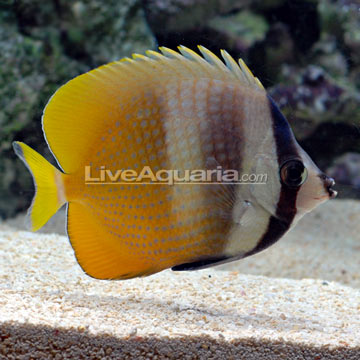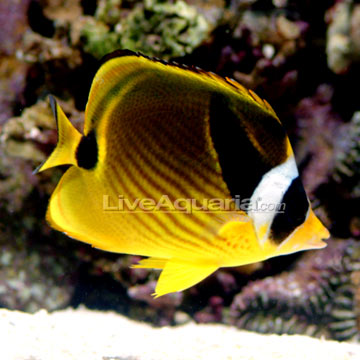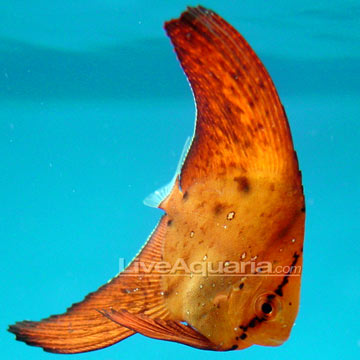The war against Aiptasia
Page 1 of 1
Which animal would you prefer in the war against Aiptasia (please explain why)
20100604

 The war against Aiptasia
The war against Aiptasia
Yesterday we treated the rock for the Sea Anemones and I haven’t seen them so far. However, since they seem to reappear each time I decided to do some research on how to prevent them from showing up. So far I found the following information.
There are several animals that have sea anemones on their menu and experiences differ with each one. My only experience so far where the Lysmata wurdemanni (Peppermint Shrimp), but they didn’t last very long in my aquarium for a yet unknown reason.
Here is a list of animals that could help according to some sites, more details later.
Fish
1. Chelmon rostratus
2. Chaetodon kleini
3. Chaetodon lunula
4. Chaetodon striatus
5. Chaetodon xanthurus
6. Platax orbicularis
7. Acreichthys tomentosus
Invertebrates
1. Rhynchocinetes uritai
2. Lysmata wurdemanni
3. Berghia verrucicornis/Aeolidiella stephanieae
Chelmon rostratus (Copperband Butterflyfish)
This fish is hard to keep and could pick on invertebrates and corals. But is claimed to be an excellent weapon against Aiptasia

Chetodon kleini (Orange Butterflyfish)
Better to take care of then the Copperband Butterflyfish, also smaller. But some don’t mention him as being a weapon against Aiptasia.

Chaetodon lunula (Raccoon Butterflyfish)
Also good to take care of, but rather big family member. A big aquarium is needed for this fish and it’s deemed to eat invertebrates and corals. Advice to keep it in a fish only aquarium. No special mention on Aiptasia, but I guess it will do the trick, since it will eat Anemones in general.

Chaetodon striatus (Banded butterflyfish)
A smaller family member again, this one is moderate to take care. Like other butterfly fish they sometimes take a pick at corals, fan worms and other anemones. But they are used to defeat an Aiptasia plague.

Chaetodon xanthurus (Pearlscale butterflyfish)
The last of the line of Butterfly fishes, and another very beautiful specimen. This one can grow up to 15 cm and is moderate to take care of. Like other butterfly fish it tends to pick at corals and invertebrates and is therefore not reef safe. But like his family members it can be used against Aiptasia.

Platax orbicularis (Orbiculate Batfish)
Moderate to take care of this fish can become very large (up to 55 cm). It needs a lot of open space to swim. Besides that it is also not a good reef dweller, it will eat many sessile invertebrates including corals and anemones. Nothing specific on eating Aiptasia however.

Acreichthys tomentosus (Matted Filefish)
Most seen fish in the battle against Aiptasia, this fish is even referred to sometimes as Aiptasia eating filefish. It’s a peaceful fish that is moderate to take care of, however it also nips at soft and stony corals.

Rhynchocinetes uritai (Camel Shrimp)
Easy to take care of, but does have the habit of picking on softcorals and polyps sometimes. Should be reef safe however, it’s just that rare occasion. Only few sites show them as an option against Aiptasia however.

Lysmata wurdemanni (Peppermint Shrimp)
A very easy to keep invertebrate which is known for its natural ability to manage Aiptasia. However, some are very good at it and other doesn’t even notice Aiptasia. They are scavengers by nature and they pick their way around the aquarium and live rock to consume detritus, uneaten food, and decomposing organic material. They are reef safe so unlike the fish mentioned earlier they don’t attack corals and other anemones.

Berghia verrucicornis/Aeolidiella stephanieae(new name)
Mixed results on there small animals. Some people say they work great against Aiptasia…well actually everywhere I read everyone says they work great, even though not much information can be found on them. But there was one site which scared me a bit, what do the Nudibranches do when there is no more Aiptasia to eat? http://sw.eyeunit.com/furandip.html.

Difficult choices, looks to me that the Peppermint shrimps are still the safest and best way to take care of Aiptasia in a natural way, even though they weren’t very successful in our aquarium. The Berghia nudibranches seem to be a good way also, but still very little information to be found on them and how they act. The sites I normally get my information from don’t have anything on these invertebrates. Also the idea of fighting one plague with something that could be another plague sounds a bit weird, I have seen many people say they inserted two and now have 20 or even more.
The camel shrimp and all fish types all have the same problem, they all seem to pick on corals and invertebrates as well. So they would make a great solution when you don’t have any small corals and invertebrates, but in an aquarium like the one we have it might be a problem.
No conclusion just yet, going to throw my findings around and see what kind of reply’s come to that. See what other people use and what their experiences are. Also opened a poll here on the forums for people to vote for their favourite, but more helpful would be to explain your choice, share your experiences.
There are several animals that have sea anemones on their menu and experiences differ with each one. My only experience so far where the Lysmata wurdemanni (Peppermint Shrimp), but they didn’t last very long in my aquarium for a yet unknown reason.
Here is a list of animals that could help according to some sites, more details later.
Fish
1. Chelmon rostratus
2. Chaetodon kleini
3. Chaetodon lunula
4. Chaetodon striatus
5. Chaetodon xanthurus
6. Platax orbicularis
7. Acreichthys tomentosus
Invertebrates
1. Rhynchocinetes uritai
2. Lysmata wurdemanni
3. Berghia verrucicornis/Aeolidiella stephanieae
Chelmon rostratus (Copperband Butterflyfish)
This fish is hard to keep and could pick on invertebrates and corals. But is claimed to be an excellent weapon against Aiptasia

Chetodon kleini (Orange Butterflyfish)
Better to take care of then the Copperband Butterflyfish, also smaller. But some don’t mention him as being a weapon against Aiptasia.

Chaetodon lunula (Raccoon Butterflyfish)
Also good to take care of, but rather big family member. A big aquarium is needed for this fish and it’s deemed to eat invertebrates and corals. Advice to keep it in a fish only aquarium. No special mention on Aiptasia, but I guess it will do the trick, since it will eat Anemones in general.

Chaetodon striatus (Banded butterflyfish)
A smaller family member again, this one is moderate to take care. Like other butterfly fish they sometimes take a pick at corals, fan worms and other anemones. But they are used to defeat an Aiptasia plague.

Chaetodon xanthurus (Pearlscale butterflyfish)
The last of the line of Butterfly fishes, and another very beautiful specimen. This one can grow up to 15 cm and is moderate to take care of. Like other butterfly fish it tends to pick at corals and invertebrates and is therefore not reef safe. But like his family members it can be used against Aiptasia.

Platax orbicularis (Orbiculate Batfish)
Moderate to take care of this fish can become very large (up to 55 cm). It needs a lot of open space to swim. Besides that it is also not a good reef dweller, it will eat many sessile invertebrates including corals and anemones. Nothing specific on eating Aiptasia however.

Acreichthys tomentosus (Matted Filefish)
Most seen fish in the battle against Aiptasia, this fish is even referred to sometimes as Aiptasia eating filefish. It’s a peaceful fish that is moderate to take care of, however it also nips at soft and stony corals.

Rhynchocinetes uritai (Camel Shrimp)
Easy to take care of, but does have the habit of picking on softcorals and polyps sometimes. Should be reef safe however, it’s just that rare occasion. Only few sites show them as an option against Aiptasia however.

Lysmata wurdemanni (Peppermint Shrimp)
A very easy to keep invertebrate which is known for its natural ability to manage Aiptasia. However, some are very good at it and other doesn’t even notice Aiptasia. They are scavengers by nature and they pick their way around the aquarium and live rock to consume detritus, uneaten food, and decomposing organic material. They are reef safe so unlike the fish mentioned earlier they don’t attack corals and other anemones.

Berghia verrucicornis/Aeolidiella stephanieae(new name)
Mixed results on there small animals. Some people say they work great against Aiptasia…well actually everywhere I read everyone says they work great, even though not much information can be found on them. But there was one site which scared me a bit, what do the Nudibranches do when there is no more Aiptasia to eat? http://sw.eyeunit.com/furandip.html.

Difficult choices, looks to me that the Peppermint shrimps are still the safest and best way to take care of Aiptasia in a natural way, even though they weren’t very successful in our aquarium. The Berghia nudibranches seem to be a good way also, but still very little information to be found on them and how they act. The sites I normally get my information from don’t have anything on these invertebrates. Also the idea of fighting one plague with something that could be another plague sounds a bit weird, I have seen many people say they inserted two and now have 20 or even more.
The camel shrimp and all fish types all have the same problem, they all seem to pick on corals and invertebrates as well. So they would make a great solution when you don’t have any small corals and invertebrates, but in an aquarium like the one we have it might be a problem.
No conclusion just yet, going to throw my findings around and see what kind of reply’s come to that. See what other people use and what their experiences are. Also opened a poll here on the forums for people to vote for their favourite, but more helpful would be to explain your choice, share your experiences.

thierry- Posts : 2238
Join date : 2009-08-18
Age : 42
Location : Zoetermeer
 Similar topics
Similar topics» Cleaning - End of Aiptasia?
» Anemonia majano (Majano Anemone)
» Aiptasia diaphana (sea anemone)
» Red Hair Algae
» Aiptasia diaphana (sea anemone)
» Anemonia majano (Majano Anemone)
» Aiptasia diaphana (sea anemone)
» Red Hair Algae
» Aiptasia diaphana (sea anemone)
Permissions in this forum:
You cannot reply to topics in this forum|
|
|
